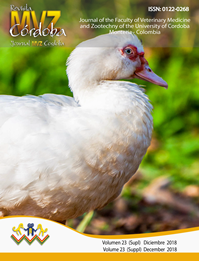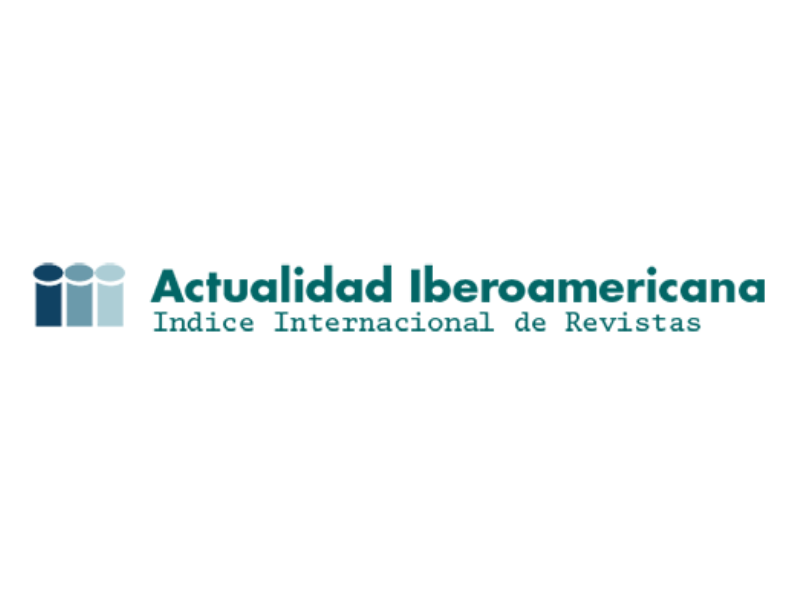Detección del virus de la enfermedad de Newcastle en aves de traspatio en Chile
Detection of Newcastle disease virus in backyard poultry in Chile
Mostrar biografía de los autores
Objetivo. Verificar la presencia del virus de la enfermedad de Newcastle (ENC) en aves de sistemas productivos de traspatio (SPT) de parte de la zona central de Chile. Materiales y métodos. Entre 2013 y 2015, un total de 1,579 hisopados orotraqueales fueron colectados de gallinas, pavos, patos y gansos pertenecientes a 328 SPT de la zona central de Chile. En cada SPT, los hisopos colectados de aves de la misma especie fueron agrupados en el mismo tubo con medio de transporte formando un pool compuesto por no más de 5 muestras. Los pooles fueron analizados por RT-PCR a tiempo real. Resultados. De un total de 364 pooles, 6 resultaron positivos al virus de la ENC. Los pooles positivos correspondieron a gallinas de las regiones de Valparaíso (n = 1) y Libertador General Bernardo O’Higgins (n=5). Ningún pool correspondiente a pavos, patos o gansos fue diagnosticado positivo. Conclusiones. Los resultados positivos demuestran la presencia del virus de la ENC en SPT en Chile. Esto podría deberse a la circulación de cepas lentogénicas del virus transmitidas por aves silvestres o bien al contacto con cepas vacunales administradas en los planteles industriales cuyas aves vacunadas pueden finalizar como SPT.
Visitas del artículo 2714 | Visitas PDF
Descargas
- Alexander DJ, Aldous EW, Fuller CM. The long view: a selective review of 40 years of Newcastle disease research. Avian Pathol. 2012; 41(4):329–35. https://doi.org/10.1080/03079457.2012.697991
- Aldous EW, Alexander DJ. Detection and differentiation of Newcastle disease virus (avian paramyxovirus type 1). Avian Pathol. 2001; 30(2):117–28. https://doi.org/10.1080/03079450120044515
- Terregino C, Aldous EW, Heidari A, Fuller CM, De Nardi R, Manvell RJ, et al. Antigenic and genetic analyses of isolate APMV/wigeon/Italy/3920-1/2005 indicate that it represents a new avian paramyxovirus (APMV-12). Arch Virol. 2013;158(11):2233–43. https://doi.org/10.1007/s00705-013-1735-2
- Alexander DJ. Newcastle disease and other avian paramyxoviruses. Rev Sci Tech Int des Epizoot. 2000;19(2):443–55. https://doi.org/10.20506/rst.19.2.1231
- World Organization for Animal Health (OIE). Newcastle Disease (Infection with Newcastle Disease Virus). Manual of diagnostic tests and vaccines for terrestrial animals : (mammals, birds and bees). 2012. 555-574 p.
- Capua I, Alexander DJ. Avian influenza and Newcastle disease: a field and laboratory manual. Springer Science & Business Media; 2009. https://doi.org/10.1007/978-88-470-0826-7
- González-Acu-a D, Gaete Á, Moreno L, Ardiles K, Cerda-Leal F, Mathieu C, et al. Anticuerpos séricos contra la enfermedad de Newcastle e Influenza Aviar en aves rapaces de Chile. Rev MVZ Cordoba. 2012;17(3):3118–24. https://doi.org/10.21897/rmvz.210
- Moreno V, García A, Mathieu C, Aguilera M, Rojas M, Vásquez M. Caracterización molecular y patogenicidad del virus de la enfermedad de Newcastle (ENC) aislado en cormoranes. Chile, 2007. Boletín Vet Of. 2009;1–13.
- Hamilton-West C, Rojas H, Pinto J, Orozco J, Hervé-Claude LP, Urcelay S. Characterization of backyard poultry production systems and disease risk in the central zone of Chile. Res Vet Sci. 2012;93(1):121–4. https://doi.org/10.1016/j.rvsc.2011.06.015
- Vandegrift KJ, Sokolow SH, Daszak P, Kilpatrick AM. Ecology of avian influenza viruses in a changing world. Ann N Y Acad Sci. 2010;1195:113–28. https://doi.org/10.1111/j.1749-6632.2010.05451.x
- Bravo-Vasquez N, Di Pillo F, Lazo A, Jiménez-Bluhm P, Schultz-Cherry S, Hamilton-West C. Presence of influenza viruses in backyard poultry and swine in El Yali wetland, Chile. Prev Vet Med. 2016;134:211–5. https://doi.org/10.1016/j.prevetmed.2016.10.004
- Grunkemeyer VL. Zoonoses, Public Health, and the Backyard Poultry Flock. Vet Clin North Am - Exot Anim Pract. 2011;14(3):477–90. https://doi.org/10.1016/j.cvex.2011.05.010
- Van Steenwinkel S, Ribbens S, Ducheyne E, Goossens E, Dewulf J. Assessing biosecurity practices, movements and densities of poultry sites across Belgium, resulting in different farm risk-groups for infectious disease introduction and spread. Prev Vet Med. 2011;98(4):259–70. https://doi.org/10.1016/j.prevetmed.2010.12.004
- Alegria-Moran R, Lazo A, Urcelay S, Hamilton-West C. Using spatial tools for high impact zoonotic agent surveillance design in backyard production systems in central Chile. Vet México OA. 2017;4(1):10–8. https://doi.org/10.21753/vmoa.4.1.435
- Instituto Nacional de Estadísticas (INE). Censo Agropecuario. Santiago, Chile. 2007.
- Dohoo IR, Martin W, Stryhn H. Veterinary epidemiologic research. AVC Incorporated Charlottetown, Canada; 2003.
- Wise MG, Suarez DL, Seal BS, Pedersen JC, Senne DA, King DJ, et al. Development of a real-time reverse-transcription PCR for detection of Newcastle disease virus RNA in clinical samples. J Clin Microbiol. 2004;42(1):329–38. https://doi.org/10.1128/JCM.42.1.329-338.2004
- Shekaili T Al, Clough H, Ganapathy K, Baylis M. Sero-surveillance and risk factors for avian influenza and Newcastle disease virus in backyard poultry in Oman. Prev Vet Med. 2015;122(1–2):145–53. https://doi.org/10.1016/j.prevetmed.2015.09.011
- Kouakou A V., Kouakou V, Kouakou C, Godji P, Kouassi AL, Krou HA, et al. Prevalence of Newcastle disease virus and infectious bronchitis virus in avian influenza negative birds from live bird markets and backyard and commercial farms in Ivory-Coast. Res Vet Sci. 2015;102:83–8. https://doi.org/10.1016/j.rvsc.2015.07.015
- Ferrer R, Icochea E, Salas A, Alba M. PREVALENCIA DE ANTICUERPOS CONTRA EL VIRUS DE LA ENFERMEDAD DE NEWCASTLE EN Gallus gallus DE LIMA . Rev Inv Vet Perú. 2008;19(1):67–74.
- Romero M, Narvaez W, Sánchez J. Enfermedad de Newcastle en aves de traspatio del eje cafetero colombiano. Rev MVZ Córdoba. 2009;14(2):1705–11. https://doi.org/10.21897/rmvz.354
- Marks FS, Rodenbusch CR, Okino CH, Hein HE, Costa EF, Machado G, et al. Targeted survey of Newcastle disease virus in backyard poultry flocks located in wintering site for migratory birds from Southern Brazil. Prev Vet Med. 2014;116(1–2):197–202. https://doi.org/10.1016/j.prevetmed.2014.06.001
- Sanchez GVE, Sánchez GVE, Castillo FC, Neira AL. La prevalencia del virus de Newcastle en pollos nativos de las comunidades rurales en el sur de Ecuador. CEDAMAZ. 2016;5(1).
- Dunowska M, Zheng T, Perrott MR, Christensen N. A survey of avian paramyxovirus type 1 infections among backyard poultry in New Zealand. N Z Vet J. 2013;61(6):316–22. https://doi.org/10.1080/00480169.2013.785915
- Servicio Agrícola y Ganadero (SAG). Informe Sanitario. División de Protección Pecuaria. Subdepartamento de Sanidad Animal. 2014.
- Moresco KA, Stallknecht DE, Swayne DE. Evaluation of different embryonating bird eggs and cell cultures for isolation efficiency of avian Influenza A Virus and Avian paramyxovirus serotype 1 from real-time reverse transcription polymerase chain reaction-positive wild bird surveillance samples. J Vet Diagnostic Investig. 2012;24(3):563–7. https://doi.org/10.1177/1040638712440991
























